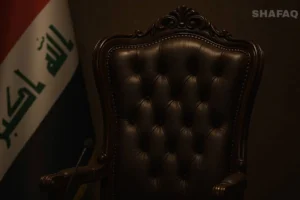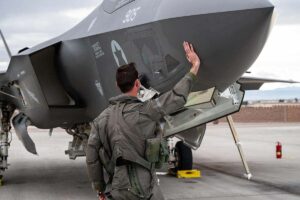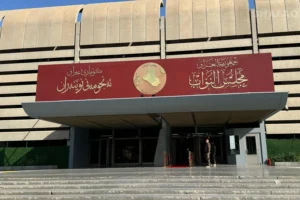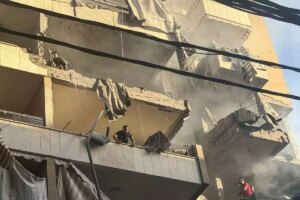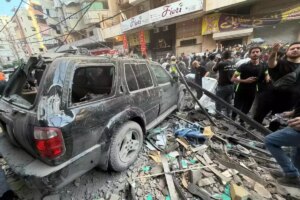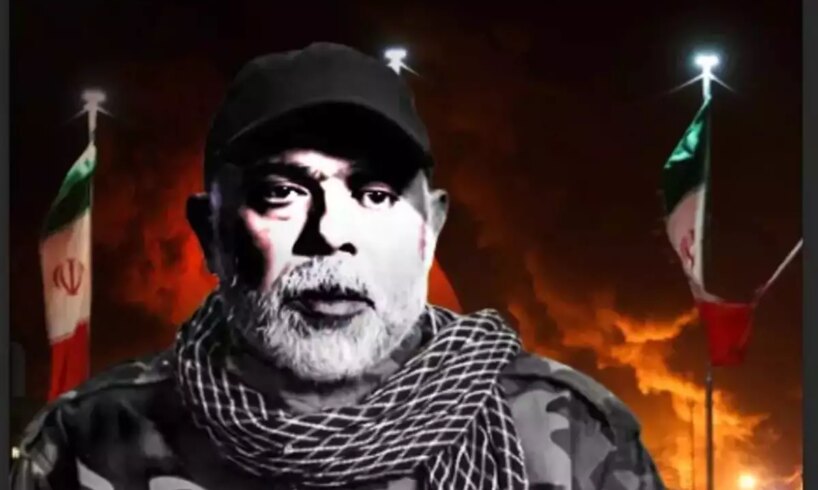
For the past year since Israel and Lebanon reached a ceasefire, Hezbollah has wrestled with a difficult question: how to respond to the relentless, daily strikes by the Israel Defense Forces (IDF) that have taken a heavy toll. Over the last year, approximately 350 of its operatives have been assassinated (following the loss of about 4,500 operatives during the war) , and its weapons stockpiles, manufacturing plants, warehouses, and infrastructure have been damaged. Hezbollah is currently making a major effort to rebuild these assets. The assassination of the organization’s de facto chief of staff, Haytham ‘Ali Tabataba’i – an accomplished officer appointed after most of the organization’s veteran military guard was decapitated – intensifies the internal debate within Hezbollah and could force a change in its policy of strategic restraint.
Video: The funeral of Ali Tabataba’i / Credit: Al-Mayadeen
Up to this point, Hezbollah’s strategic decision has been to avoid skirmishing with Israel, claiming that confronting Israel is the Lebanese state’s responsibility, and prioritizing its own reconstruction. The organization has demonstrated strategic patience. Concurrently with the IDF attacks over the past year, it has acted determinedly by reorganizing its arrays, collecting and attempting to upgrade the weapons that survived the war, and finding alternative routes to smuggle in new weapons and funds to increase its power. Its operatives have operated discreetly and kept a low profile. They maintain a radical religious ideology, driven by hatred for Israel and the determination to restore the organization to its former position as a threat to Israel’s residents and a strong deterrent against the IDF.
Supporters of Lebanon’s Hezbollah militant group block the streets with burning tires as they rally in cars and motorbikes to protest the government’s endorsement of a plan to disarm it, in Beirut’s southern suburbs early on August 8, 2025 (Ibrahim AMRO / AFP)
While Israel’s military superiority is a primary factor restraining the organization, it’s not the only reason for Hezbollah’s restraint. Following its wartime defeat, Hezbollah’s prominent standing within the Lebanese political system also diminished. Despite still being the country’s strongest military force, it must consider domestic opponents. These opponents accuse Hezbollah of severely harming Lebanon – contradicting its claim of being “Lebanon’s defender” – by fighting Israel to serve the foreign interests of Iran and the Palestinians. The disarmament of Hezbollah, led by the new Lebanese leadership, President Joseph Aoun and Prime Minister Nawaf Salam, is the primary issue currently on the Lebanese agenda. However, the killing of Tabataba’i, along with four other Hezbollah operatives in the heart of the Dahiyeh area in Beirut, is pressuring the organization to execute a military response rather than limit itself to threats.
Hezbollah has a wide range of options , and it still possesses the capability to act. It retains military capabilities from the war , supplemented by additional weapons it has managed to smuggle in and develop over the past year, with direct assistance from Iran. Iran increased its influence over the organization following the assassination of Nasrallah and is committed to supporting its rearmament in every way possible. US diplomatic officials indicate that Iran transferred approximately $1 billion to Hezbollah for reconstruction purposes in the past year alone. Despite this support, it is unlikely that Tehran, preoccupied with its own internal issues and efforts to find an acceptable solution with the international community concerning its nuclear interests , would now push the battered Hezbollah into an adventure against Israel.
Nonetheless, the organization could adopt a broad set of options for a possible response against Israeli targets. These potential actions include attacking IDF forces in the five locations it still controls within Lebanon; firing on northern communities or infiltrating a cell into Israel; launching deeper missile fire aimed at the Israeli home front; or carrying out a terror operation against Israeli targets abroad by Hezbollah itself or its partners in the axis, such as Palestinian operatives in Lebanon, the Houthis in Yemen, and the Shiite militias in Iraq. Israel should also account for the possibility of an operation by rogue elements within Hezbollah that might disregard a decision to continue exercising restraint.
Haytham ‘Ali Tabataba’i against the background of his assassination site (AFP / Ibrahim AMRO)
Considering its current difficult state, it’s probable that the official Hezbollah, led by the new Secretary-General Naim Qassem – who lacks significant respect – will seek to avoid another wide-ranging round of fighting with Israel , especially since Israel has already threatened a disproportionate response. The organization will likely choose to postpone its response or, due to internal pressure, settle for a limited, symbolic action along the border or overseas, while continuing its efforts to increase its power in anticipation of the next campaign. The challenge for the IDF therefore remains. However, residents of the north can rest assured: the army has the upper hand this time and is prepared for any scenario.
Orna Mizrahi, a senior researcher at the Institute for National Security Studies, joined INSS in December 2018, after a long career in the Israeli security establishment: 26 years in the IDF (ret. Lt. Col.) and 12 years in the National Security Council (NSC) in the Prime Minister’s Office (she served under 8 heads of the NSC).
